Haokai Hong
PII-Bench: Evaluating Query-Aware Privacy Protection Systems
Feb 25, 2025Abstract:The widespread adoption of Large Language Models (LLMs) has raised significant privacy concerns regarding the exposure of personally identifiable information (PII) in user prompts. To address this challenge, we propose a query-unrelated PII masking strategy and introduce PII-Bench, the first comprehensive evaluation framework for assessing privacy protection systems. PII-Bench comprises 2,842 test samples across 55 fine-grained PII categories, featuring diverse scenarios from single-subject descriptions to complex multi-party interactions. Each sample is carefully crafted with a user query, context description, and standard answer indicating query-relevant PII. Our empirical evaluation reveals that while current models perform adequately in basic PII detection, they show significant limitations in determining PII query relevance. Even state-of-the-art LLMs struggle with this task, particularly in handling complex multi-subject scenarios, indicating substantial room for improvement in achieving intelligent PII masking.
Fast 3D Molecule Generation via Unified Geometric Optimal Transport
May 24, 2024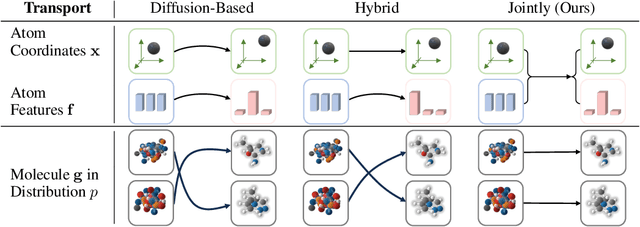
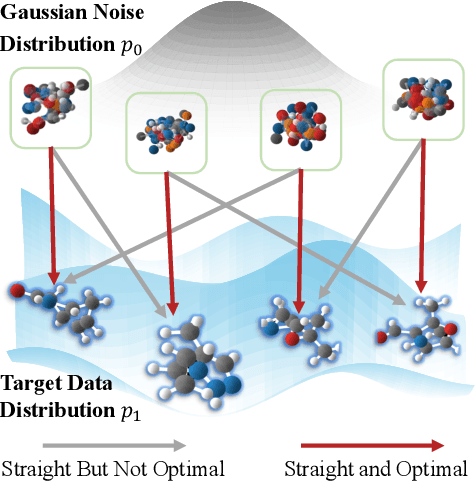
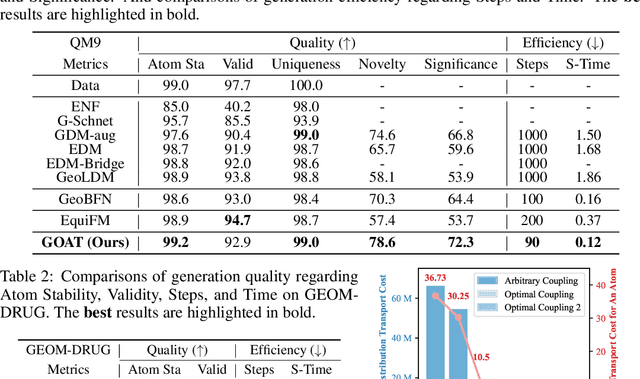
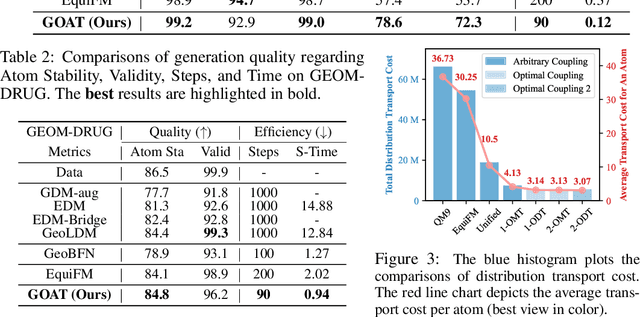
Abstract:This paper proposes a new 3D molecule generation framework, called GOAT, for fast and effective 3D molecule generation based on the flow-matching optimal transport objective. Specifically, we formulate a geometric transport formula for measuring the cost of mapping multi-modal features (e.g., continuous atom coordinates and categorical atom types) between a base distribution and a target data distribution. Our formula is solved within a unified, equivalent, and smooth representation space. This is achieved by transforming the multi-modal features into a continuous latent space with equivalent networks. In addition, we find that identifying optimal distributional coupling is necessary for fast and effective transport between any two distributions. We further propose a flow refinement and purification mechanism for optimal coupling identification. By doing so, GOAT can turn arbitrary distribution couplings into new deterministic couplings, leading to a unified optimal transport path for fast 3D molecule generation. The purification filters the subpar molecules to ensure the ultimate generation performance. We theoretically prove the proposed method indeed reduced the transport cost. Finally, extensive experiments show that GOAT enjoys the efficiency of solving geometric optimal transport, leading to a double speedup compared to the sub-optimal method while achieving the best generation quality regarding validity, uniqueness, and novelty.
Diffusion-Driven Domain Adaptation for Generating 3D Molecules
Apr 01, 2024
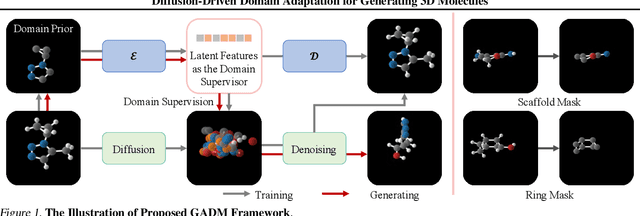

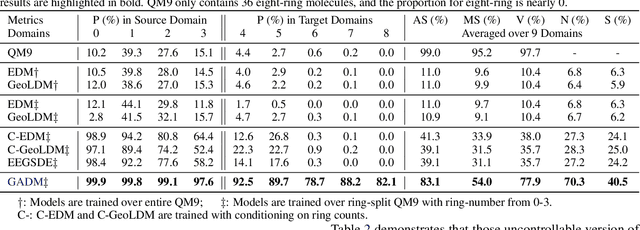
Abstract:Can we train a molecule generator that can generate 3D molecules from a new domain, circumventing the need to collect data? This problem can be cast as the problem of domain adaptive molecule generation. This work presents a novel and principled diffusion-based approach, called GADM, that allows shifting a generative model to desired new domains without the need to collect even a single molecule. As the domain shift is typically caused by the structure variations of molecules, e.g., scaffold variations, we leverage a designated equivariant masked autoencoder (MAE) along with various masking strategies to capture the structural-grained representations of the in-domain varieties. In particular, with an asymmetric encoder-decoder module, the MAE can generalize to unseen structure variations from the target domains. These structure variations are encoded with an equivariant encoder and treated as domain supervisors to control denoising. We show that, with these encoded structural-grained domain supervisors, GADM can generate effective molecules within the desired new domains. We conduct extensive experiments across various domain adaptation tasks over benchmarking datasets. We show that our approach can improve up to 65.6% in terms of success rate defined based on molecular validity, uniqueness, and novelty compared to alternative baselines.
Pre-Evolved Model for Complex Multi-objective Optimization Problems
Dec 11, 2023Abstract:Multi-objective optimization problems (MOPs) necessitate the simultaneous optimization of multiple objectives. Numerous studies have demonstrated that evolutionary computation is a promising paradigm for solving complex MOPs, which involve optimization problems with large-scale decision variables, many objectives, and expensive evaluation functions. However, existing multi-objective evolutionary algorithms (MOEAs) encounter significant challenges in generating high-quality populations when solving diverse complex MOPs. Specifically, the distinct requirements and constraints of the population result in the inefficiency or even incompetence of MOEAs in addressing various complex MOPs. Therefore, this paper proposes the concept of pre-evolving for MOEAs to generate high-quality populations for diverse complex MOPs. Drawing inspiration from the classical transformer architecture, we devise dimension embedding and objective encoding techniques to configure the pre-evolved model (PEM). The PEM is pre-evolved on a substantial number of existing MOPs. Subsequently, when fine-evolving on new complex MOPs, the PEM transforms the population into the next generation to approximate the Pareto-optimal front. Furthermore, it utilizes evaluations on new solutions to iteratively update the PEM for subsequent generations, thereby efficiently solving various complex MOPs. Experimental results demonstrate that the PEM outperforms state-of-the-art MOEAs on a range of complex MOPs.
Improving Performance Insensitivity of Large-scale Multiobjective Optimization via Monte Carlo Tree Search
Apr 14, 2023Abstract:The large-scale multiobjective optimization problem (LSMOP) is characterized by simultaneously optimizing multiple conflicting objectives and involving hundreds of decision variables. Many real-world applications in engineering fields can be modeled as LSMOPs; simultaneously, engineering applications require insensitivity in performance. This requirement usually means that the results from the algorithm runs should not only be good for every run in terms of performance but also that the performance of multiple runs should not fluctuate too much, i.e., the algorithm shows good insensitivity. Considering that substantial computational resources are requested for each run, it is essential to improve upon the performance of the large-scale multiobjective optimization algorithm, as well as the insensitivity of the algorithm. However, existing large-scale multiobjective optimization algorithms solely focus on improving the performance of the algorithms, leaving the insensitivity characteristics unattended. In this work, we propose an evolutionary algorithm for solving LSMOPs based on Monte Carlo tree search, the so-called LMMOCTS, which aims to improve the performance and insensitivity for large-scale multiobjective optimization problems. The proposed method samples the decision variables to construct new nodes on the Monte Carlo tree for optimization and evaluation. It selects nodes with good evaluation for further search to reduce the performance sensitivity caused by large-scale decision variables. We compare the proposed algorithm with several state-of-the-art designs on different benchmark functions. We also propose two metrics to measure the sensitivity of the algorithm. The experimental results confirm the effectiveness and performance insensitivity of the proposed design for solving large-scale multiobjective optimization problems.
A Recommender System Approach for Very Large-scale Multiobjective Optimization
Apr 08, 2023

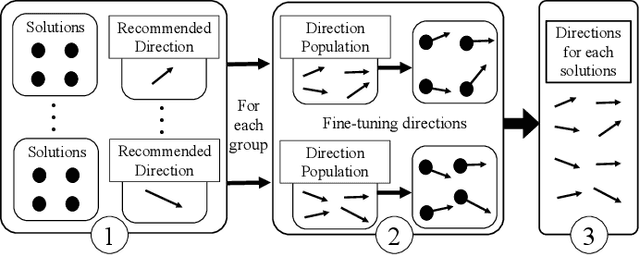
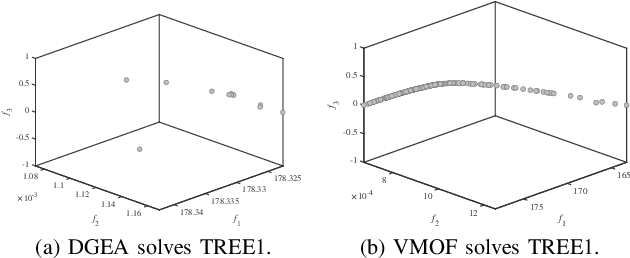
Abstract:We define very large multi-objective optimization problems to be multiobjective optimization problems in which the number of decision variables is greater than 100,000 dimensions. This is an important class of problems as many real-world problems require optimizing hundreds of thousands of variables. Existing evolutionary optimization methods fall short of such requirements when dealing with problems at this very large scale. Inspired by the success of existing recommender systems to handle very large-scale items with limited historical interactions, in this paper we propose a method termed Very large-scale Multiobjective Optimization through Recommender Systems (VMORS). The idea of the proposed method is to transform the defined such very large-scale problems into a problem that can be tackled by a recommender system. In the framework, the solutions are regarded as users, and the different evolution directions are items waiting for the recommendation. We use Thompson sampling to recommend the most suitable items (evolutionary directions) for different users (solutions), in order to locate the optimal solution to a multiobjective optimization problem in a very large search space within acceptable time. We test our proposed method on different problems from 100,000 to 500,000 dimensions, and experimental results show that our method not only shows good performance but also significant improvement over existing methods.
Balancing Exploration and Exploitation for Solving Large-scale Multiobjective Optimization via Attention Mechanism
May 20, 2022

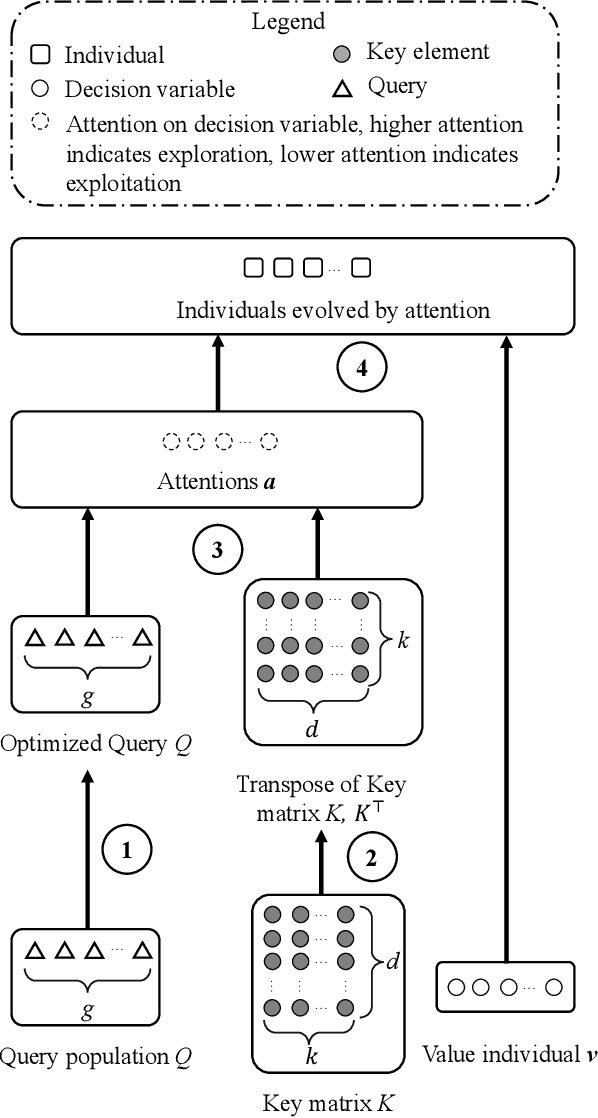

Abstract:Large-scale multiobjective optimization problems (LSMOPs) refer to optimization problems with multiple conflicting optimization objectives and hundreds or even thousands of decision variables. A key point in solving LSMOPs is how to balance exploration and exploitation so that the algorithm can search in a huge decision space efficiently. Large-scale multiobjective evolutionary algorithms consider the balance between exploration and exploitation from the individual's perspective. However, these algorithms ignore the significance of tackling this issue from the perspective of decision variables, which makes the algorithm lack the ability to search from different dimensions and limits the performance of the algorithm. In this paper, we propose a large-scale multiobjective optimization algorithm based on the attention mechanism, called (LMOAM). The attention mechanism will assign a unique weight to each decision variable, and LMOAM will use this weight to strike a balance between exploration and exploitation from the decision variable level. Nine different sets of LSMOP benchmarks are conducted to verify the algorithm proposed in this paper, and the experimental results validate the effectiveness of our design.
Solving Large-Scale Multi-Objective Optimization via Probabilistic Prediction Model
Jul 16, 2021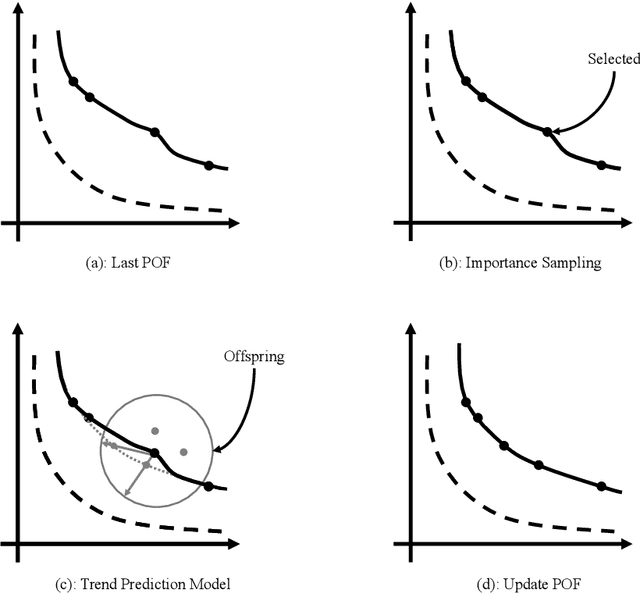
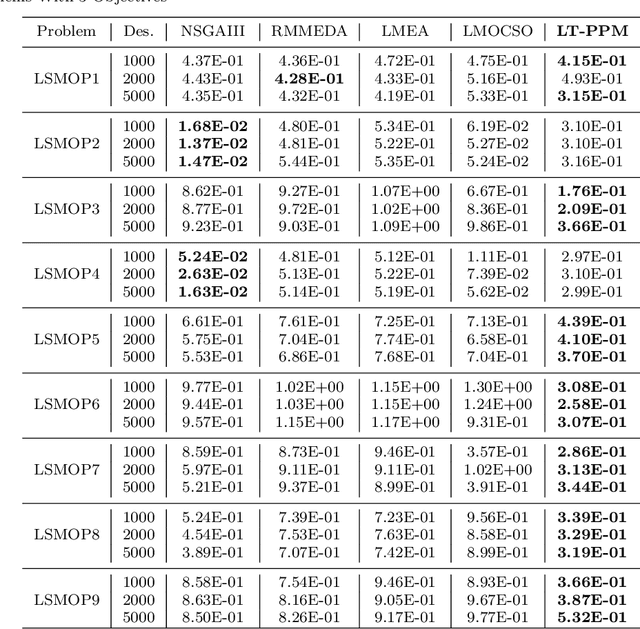
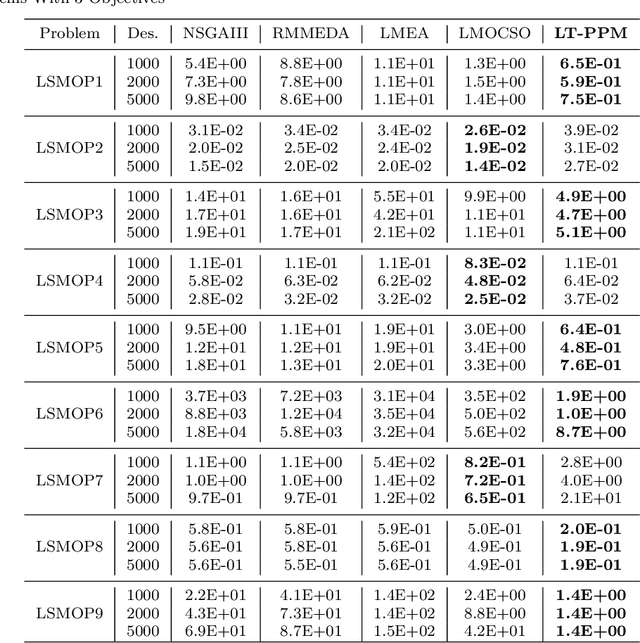
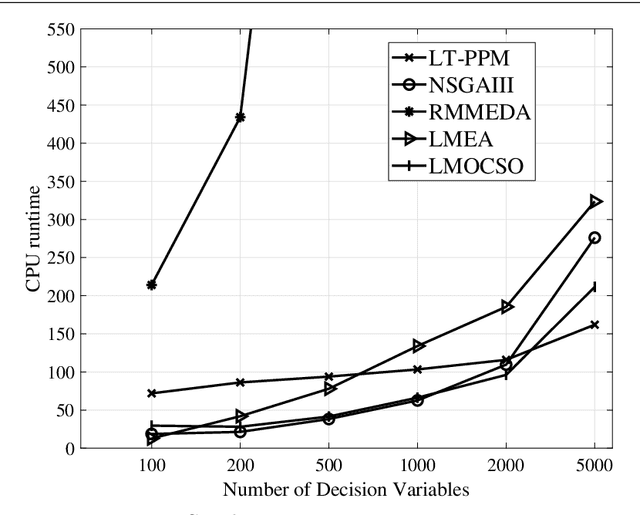
Abstract:The main feature of large-scale multi-objective optimization problems (LSMOP) is to optimize multiple conflicting objectives while considering thousands of decision variables at the same time. An efficient LSMOP algorithm should have the ability to escape the local optimal solution from the huge search space and find the global optimal. Most of the current researches focus on how to deal with decision variables. However, due to the large number of decision variables, it is easy to lead to high computational cost. Maintaining the diversity of the population is one of the effective ways to improve search efficiency. In this paper, we propose a probabilistic prediction model based on trend prediction model and generating-filtering strategy, called LT-PPM, to tackle the LSMOP. The proposed method enhances the diversity of the population through importance sampling. At the same time, due to the adoption of an individual-based evolution mechanism, the computational cost of the proposed method is independent of the number of decision variables, thus avoiding the problem of exponential growth of the search space. We compared the proposed algorithm with several state-of-the-art algorithms for different benchmark functions. The experimental results and complexity analysis have demonstrated that the proposed algorithm has significant improvement in terms of its performance and computational efficiency in large-scale multi-objective optimization.
Manifold Interpolation for Large-Scale Multi-Objective Optimization via Generative Adversarial Networks
Jan 08, 2021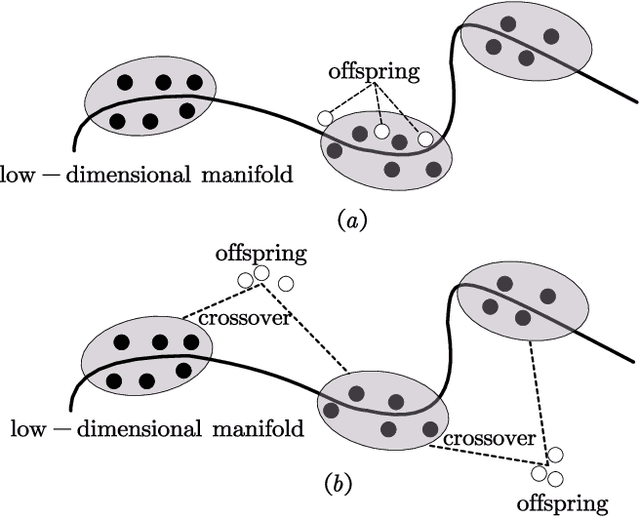


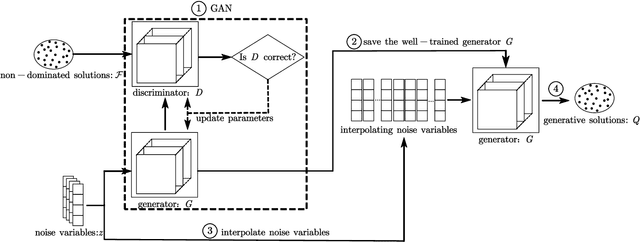
Abstract:Large-scale multiobjective optimization problems (LSMOPs) are characterized as involving hundreds or even thousands of decision variables and multiple conflicting objectives. An excellent algorithm for solving LSMOPs should find Pareto-optimal solutions with diversity and escape from local optima in the large-scale search space. Previous research has shown that these optimal solutions are uniformly distributed on the manifold structure in the low-dimensional space. However, traditional evolutionary algorithms for solving LSMOPs have some deficiencies in dealing with this structural manifold, resulting in poor diversity, local optima, and inefficient searches. In this work, a generative adversarial network (GAN)-based manifold interpolation framework is proposed to learn the manifold and generate high-quality solutions on this manifold, thereby improving the performance of evolutionary algorithms. We compare the proposed algorithm with several state-of-the-art algorithms on large-scale multiobjective benchmark functions. Experimental results have demonstrated the significant improvements achieved by this framework in solving LSMOPs.
 Add to Chrome
Add to Chrome Add to Firefox
Add to Firefox Add to Edge
Add to Edge